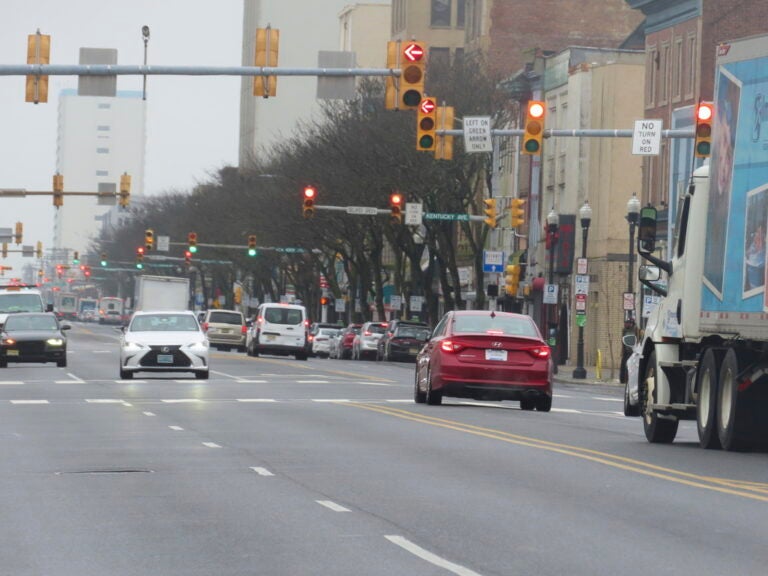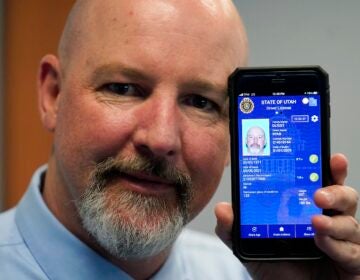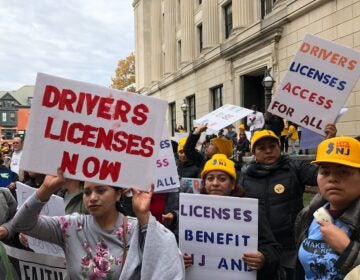New rule for new drivers in N.J.: What parents need to know about the mandatory requirement
Parents and guardians must now certify their teen driver has logged 50 hours of supervised practice, including 10 hours at night, before they can get a probationary license.
Listen 1:08
Vehicles stop at traffic lights along Atlantic Avenue in Atlantic City, N.J. on Jan. 26, 2024. (AP Photo/Wayne Parry)
From Philly and the Pa. suburbs to South Jersey and Delaware, what would you like WHYY News to cover? Let us know!
New Jersey has a new mandate designed to ensure novice drivers get enough practice driving before they head out alone on the Garden State’s highways and byways.
William Connolly, press secretary for the New Jersey Motor Vehicle Commission, said the law that took effect this month and requires permit holders under the age of 21 to complete a minimum of 50 hours of supervised practice driving, including 10 hours at night. The law stipulates supervised practice for drivers under 21 needs to be completed over a six-month period.
“Once you’ve completed the supervised practice driving you go for your road test, and if you pass the road test, you then come into one of our licensing centers and apply for the probationary driver license,” he said. “Supervised driving means that you are accompanied in the front seat by an adult who is at least 21 years of age who has a valid New Jersey driver’s license and a minimum of three years driving experience.”
New Jersey was one of only three states in the country that did not require practice hours for new drivers. The other two are Arkansas and Mississippi.
Tracy Noble, public and government affairs manager for AAA Club Alliance, said practice makes perfect.
“We live in the most densely populated state, we also live in a state that has various different regions, different traffic patterns, different roadway types and new drivers need to be prepared for all of it,” she said.
Connolly said the state’s graduated driver’s license program introduces driving privileges in stages.
The first step in the process
Teenagers are eligible for a special learner’s permit at age 16, if they are enrolled in a high school driver education program or at a licensed driving school.
“You will take a knowledge test which is also known as a written test, you will take a vision test, and six hours of behind the wheel instruction with a licensed driving instructor,” Connolly said.
Once the aspiring drivers pass the tests and complete the six-hour training, their permit is validated, allowing them to practice supervised.
Getting the probationary license
Drivers have to complete 50 hours of supervised driving practice and pass the road test and must be at least 17 years old before they qualify for a probationary license.
“When you have that you can practice what we call unsupervised driving, you are allowed to drive no later than 11 p.m. at night and no earlier than 5 a.m.,” he said. “No distractions, meaning no cell phones, no hand-held devices.”
Drivers under the age of 21 with a probationary license must place a red decal on the upper left-hand corner of the vehicle’s license plate.
Parents, guardians or dependents are allowed as passengers. A dependent can be the driver’s child, not a brother or sister. Only one additional passenger is allowed in the vehicle unless accompanied by a parent or guardian.
Getting a regular license
The NJ MVC requires those with a probationary driver’s license to continue unsupervised driving for one year. After that period, it can be upgraded to a basic license online.
If a driver doesn’t upgrade within three and a half years of receiving the probationary license, they have to make an appointment at a Licensing Center to renew their probationary license.
Making the roads safer
Connolly said in a densely populated state like New Jersey, the new requirement makes sense.
“This law is underscoring the importance of practice, getting behind the wheel, putting the time in behind the wheel, for new and young drivers and teen drivers this is especially important,” he said. “We want them to get the experience of driving on New Jersey’s roads, in different contexts, in different environments, at night, during the day.”
Noble said it’s important to teach new drivers that their focus should solely be on the road. Drivers should not be talking, texting or fooling around when they’re behind the wheel, and parents need to practice what they preach.
“Over the past several years we’ve just seen an epidemic of unsafe behavior behind the wheel, so we need people to be engaged, especially when they’re teaching teens to drive,” she said.
Once the 50 hours of practice driving are completed, the parent, guardian or supervising driver must sign a form certifying the new driver has spent the required amount of practice time behind the wheel.
“We’ve heard numerous times over the years, ‘Oh I can’t drive with my kid, it makes me too nervous.’ Well, you need to get beyond the nervousness and actually teach them how to drive,” Noble said.
More information about getting a driver’s license is available at the New Jersey Motor Vehicle website.

Get daily updates from WHYY News!
WHYY is your source for fact-based, in-depth journalism and information. As a nonprofit organization, we rely on financial support from readers like you. Please give today.






